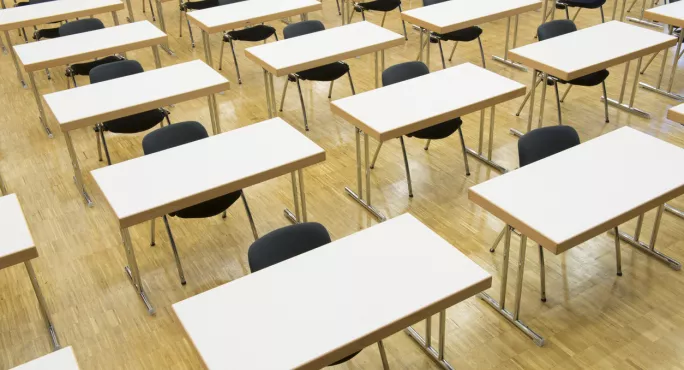GCSEs: Struggling students could get four years to pass

Some exam students could be given four years to do English and maths GCSEs to reduce the chance of them failing, the education recovery commissioner has suggested.
Sir Kevan Collins said there is a “big discussion” to be had about the future of GCSEs and online exams.
GCSEs 2021: Teacher assessment risks bias, warns Ofqual
Ofqual: ‘We need to keep an eye on grade inflation’
Viewpoint: How to avoid a repeat of the 2020 results debacle
Addressing the Lords Youth Unemployment Committee, he said: “I think we need to move more quickly to assess online because I think that is the future.
“That opens up the opportunity, particularly in A levels, to make sure that people get their grades before they get their offers for university, which I think is another conversation we should be having.”
The government’s education recovery commissioner said that some struggling students, who need English and maths GCSEs to progress to an apprenticeship or work, could be given longer to do their GCSEs.
Students in England who achieve a grade 3 (the equivalent of a D) in their maths or English GCSEs are currently required to retake the qualification until they get at least a grade 4.
The problem of students repeatedly resitting GCSEs
Students with a grade 2 or below can either retake their GCSE until they get at least a grade 4 or they can study towards a pass in functional skills level 2 qualification.
Sir Kevan told the peers: “The problem with the GCSEs, of course, is that for too many young people they are then asked to do their GCSEs again.
“And then when they do them the second time - in England if you don’t achieve a certain level of English and maths at 16, you are asked to repeat your GCSEs in English and maths. And in that second chance, the vast majority don’t pass again the second chance, so we have this issue where we ask you to do something, you fail, you do it again and you fail - there has got to be a better way of doing that.
“If we think the level 2 qualification is the key marker that accesses you into apprenticeships and work, perhaps for some young people we could give them four years to take that exam rather than two years and fail, two years and fail.”
His comments came after changes to assessment over the past two years have triggered calls across the sector for GCSEs to be reformed post-Covid.
Sir Kevan is currently considering long-term proposals to address the impact of Covid on children.
Addressing peers, Sir Kevan added: “These are just my views after spending nearly 40 years in this education system.”
Prime minister Boris Johnson has already made £1.7 billion of catch-up funding available in England to help children who have faced disruption from school and college closures due to Covid-19.
When asked what positives from the pandemic could be replicated in schools in the longer term, Sir Kevan suggested that hosting parents’ evenings on Zoom was better than in-person meet-ups.
He said: “I think there have been a few captures, if you like, from the experience, so the first and obvious one is the huge leap forward we’ve made in the way that technology now is part of education and how that is now becoming woven into the fabric of how we provide good learning.”
Sir Kevan added: “So a good example would be many schools now create online lessons that you can just flip between school and home, and you actually extend the experience.
“The way that schools do parents’ evenings I don’t think will ever be the same again.
“Zoom for parents’ evenings is much better than trying to find a car parking space on a wet Tuesday and waiting your turn.”
Addressing the digital divide, he said: “We know that the DfE has done a pretty remarkable job in distributing well over a million laptops, but we probably need to go even further.
“It is going to be fundamental for every child who’s got to learn, to access not only to the hardware but to the connectivity, so I think technology is a capture and a challenge.”
Register with Tes and you can read two free articles every month plus you'll have access to our range of award-winning newsletters.
Keep reading with our special offer!
You’ve reached your limit of free articles this month.
- Unlimited access to all Tes magazine content
- Save your favourite articles and gift them to your colleagues
- Exclusive subscriber-only stories
- Over 200,000 archived articles
- Unlimited access to all Tes magazine content
- Save your favourite articles and gift them to your colleagues
- Exclusive subscriber-only stories
- Over 200,000 archived articles
topics in this article



